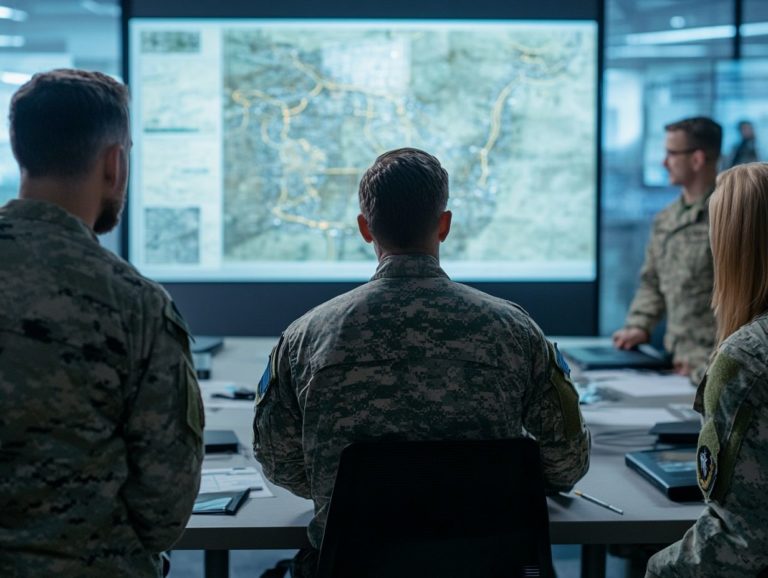The Importance of Trial Preparation in Defense
Trial preparation is a key part of the legal process, especially for defense attorneys committed to ensuring fair trials for their clients.
This article explores what trial preparation entails and its critical role in protecting rights and building a strong defense strategy.
You will learn about the essential steps for getting ready for trial, the common challenges that can arise, and effective techniques to strengthen your case.
Whether you are a legal professional or someone eager to understand the judicial system, this guide provides valuable insights into trial preparation.
Contents
- Key Takeaways:
- Understanding Trial Preparation
- Importance of Trial Preparation in Defense
- Steps in Trial Preparation for Defense
- Common Challenges in Trial Preparation
- Effective Trial Preparation Techniques
- Frequently Asked Questions
- What is the importance of trial preparation in defense, and how does it benefit a defense case?
- What steps are involved in trial preparation for a defense case?
- Can trial preparation help in negotiating a plea deal?
- How far in advance should trial preparation begin?
- Is trial preparation necessary even if the defendant is innocent?
Key Takeaways:

Effective trial preparation is essential. It protects rights and builds strong defenses, leading to better outcomes. Gathering evidence and developing a strategic defense are crucial steps for success.
Understanding Trial Preparation
Understanding trial preparation is vital for both prosecutors and defense attorneys. It sets the stage for the entire legal process. You need to plan carefully to ensure a fair trial, present evidence effectively, and manage courtroom complexities.
Trial preparation involves more than just organizing documents or witness testimony. It is a thorough legal strategy that engages every team member. This phase highlights the importance of understanding the trial process, from jury selection to the final verdict, as well as the emotional strain faced by clients and witnesses.
What is Trial Preparation?
Trial preparation is the careful process you follow to get ready for a courtroom trial. It ensures that each piece of evidence and testimony is organized and strategically planned. This preparation is crucial for effective legal representation and can significantly affect your case’s outcome.
During this process, you carefully gather and organize evidence from documents to physical items deciding how each element will support your arguments.
Preparing witnesses is another important part of trial prep. You will coach them on what to expect, review their testimonies, and address potential challenges during cross-examination.
Developing solid legal strategies involves outlining your arguments, anticipating opposing views, and determining the best ways to present your case. Each component is crucial for crafting a persuasive narrative that connects with the jury and ultimately influences your case’s success.
Importance of Trial Preparation in Defense
The importance of trial preparation in defense cannot be overstated. It protects the rights of the accused and promotes fair trials within the judicial system.
When you are well-prepared, you can effectively challenge criminal charges, present convincing arguments, and connect with the jury.
Proper trial preparation requires careful planning, thorough evidence gathering, and anticipating the prosecution’s strategies. This diligence ensures your defense team meets its legal responsibilities and strives for the best outcome for your client.
Ensuring Fair Trial and Protecting Rights

Ensuring a fair trial and protecting the rights of the accused are your top responsibilities during trial preparation. This phase is critical not just for your client but also for maintaining the integrity of the judicial system. By safeguarding constitutional rights, you help make justice a reality.
As a skilled defense attorney, you play an essential role in this process. You analyze evidence, develop strong legal strategies, and prepare clear jury instructions that explain the case’s details. Your support extends beyond the courtroom to include pre-trial motions, negotiations, and keeping open communication with your client.
While navigating the complexities of the law, remember that every individual deserves representation and a fair assessment of the facts.
Steps in Trial Preparation for Defense
The steps in trial preparation for defense require a careful approach. This involves gathering evidence, crafting a defense strategy, and preparing witnesses for their vital roles in the courtroom.
Each element is essential to presenting a compelling case and navigating the intricacies of the legal process with confidence.
Gathering Evidence and Building a Strategy
Gathering evidence and crafting a strategy are key elements of trial preparation that significantly impact your ability to counter prosecution claims. This process includes the careful collection of various forms of evidence think physical objects, documents, and digital records all serving as critical building blocks in weaving a compelling narrative.
Corroborating witness testimony is crucial. Ensuring that multiple perspectives align boosts credibility and strengthens your defense’s position. Each piece of evidence and every statement is a vital thread in the intricate fabric of a robust defense strategy.
Together, they create a clear framework that challenges the prosecution’s assertions and resonates with the jury’s understanding of the case.
Common Challenges in Trial Preparation
Common challenges in trial preparation can significantly impede your ability as a defense attorney to advocate effectively for your client.
These obstacles often arise from limited resources, time constraints, and the complex legal obligations inherent in the trial process.
Overcoming Obstacles and Limitations

Overcoming obstacles and limitations during trial preparation demands a proactive approach. Adapt your strategies to tackle unexpected challenges and ensure effective courtroom management.
By employing creative problem-solving techniques, you can navigate the complexities of each case while remaining flexible in your plans. Building a solid foundation of effective communication within your legal team is essential. Regular discussions will help you identify potential issues early and foster collaborative solutions.
Contingency planning, or preparing for unexpected events, is critical. It enables you to anticipate possible setbacks and create backup strategies to mitigate risks. Utilizing these methods enhances your team’s readiness and instills confidence in your ability to handle any situation that may arise during the trial.
Effective Trial Preparation Techniques
Effective trial preparation techniques are crucial in crafting a robust defense case.
They empower attorneys to present compelling arguments, navigate the complexities of the courtroom, and engage the jury with confidence and clarity.
Tips for a Strong Defense Case
To build a strong defense case, prioritize thorough trial preparation and effective communication with your legal team. Leverage the insights of expert witnesses to bolster credibility.
By meticulously researching juror backgrounds and potential biases, you can select individuals more likely to resonate with your arguments. Establishing a solid rapport with witnesses is equally essential, as their reliability can greatly influence a jury’s perception.
Remember, courtroom presentation is crucial for maintaining engagement and trust. Employing clear visuals and compelling storytelling techniques can transform complex legal arguments into something more digestible for jurors.
By honing in on these key areas, you can significantly enhance your case and improve your chances of a favorable outcome.
Frequently Asked Questions
What is the importance of trial preparation in defense, and how does it benefit a defense case?

Trial preparation is essential for building a successful defense case. It involves gathering evidence, analyzing legal strategies, and preparing witnesses for testimony.
Effective trial preparation allows defense attorneys to anticipate the prosecution’s arguments and build a strong defense to counter them. It also helps identify weaknesses in the case and find ways to address them.
What steps are involved in trial preparation for a defense case?
Trial preparation involves several key steps. These include reviewing police reports, interviewing witnesses, and researching legal cases.
Can trial preparation help in negotiating a plea deal?
Yes, a well-prepared defense can lead to better plea deals. If the prosecution sees a strong defense, they might offer a deal instead of risking a trial.
How far in advance should trial preparation begin?
Start trial preparation right after charges are filed. This gives enough time to gather evidence and build a strong defense.
Is trial preparation necessary even if the defendant is innocent?
Yes, preparing for trial is necessary, even if the defendant is innocent. The prosecution might have strong arguments that need addressing.






